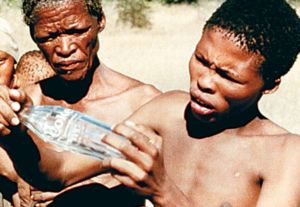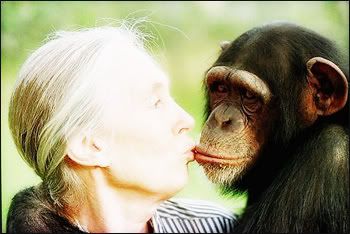
Timothy Treadwell was an environmentalist, a documentary film maker, and the star of Werner Herzog's universally praised Grizzly Man. After watching the film, I was left with two very different impressions of Treadwell. With his jumpy, bubbly, slightly narcissistic demeanor and a strangely child-like and dramatic pattern of speech, I was sure this guy was either on drugs, or simply a lunatic on a rather interesting mission.
What was his mission, anyway? To protect the bears. Kind of odd, if you think about it. The grizzlies are probably as safe as they'll ever be in the Katmai National Park and Preserve. By spending so much time with the bears at such a close distance, Treadwell was putting not only himself in danger, but also other visitors and the bears themselves. The rangers in the park do their best to keep the bears away from any human influence, and so when people approach the bears, they are usually calm and uninterested. Treadwell's constant "interactions" with the bears could very well have upset that conditioned immunity to the human presence. In a place where they're trying to preserve species in their natural habitats, it's probably unwise to have a human (who I'm convinced has some issues up in the noggin) roaming around.
I found it extremely amusing how Treadwell liked to befriend every animal, but I'm not sure if that's a good thing. He had trapped himself in a delusion that the bears had almost accepted him as a companion, a protector, when in fact his affections were unrequited. I believe that this idea played a crucial role in his death. He thought the bears recognized him and needed him, and he let himself be too defenseless. It's true that the season was bad for fishing when Treadwell was eaten, but I wouldn't be surprised if the cause was something else (like the bears had lost interest in this weird little blond creature that stalked them all the time with a freaky voice and an oddly shaped rock that sometimes had three legs).
Few people would willingly give up everything and risk their lives out in the wild among creatures that could easily take down a well-built man, but I think this was Treadwell's salvation; his only escape. After his dreams of being a Hollywood actor were shattered, he turned to drugs and his life was a chaos. Perhaps he sought for a simpler life, and he found that kind of comfort in the wild with the bears, which coincidentally he had a tremendous fascination with.
Despite the harm and troubles he brought to the animals and the Alaskan park's authorities, Treadwell had good intentions and he did do some pretty darn good things. His breathtaking footage of nature and the animals is proof enough, and he also taught kids in school about his experiences in the wild. He was brave and determined, and I respect and admire him for that, but there comes a time when under such circumstances, too much bravery and determination can be reckless.








+copy.jpg)